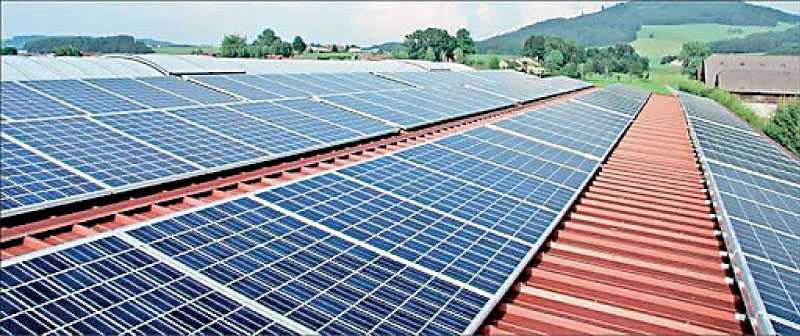Thursday Feb 26, 2026
Thursday Feb 26, 2026
Thursday, 31 December 2020 01:30 - - {{hitsCtrl.values.hits}}

The renewable energy industry has appealed for the Government to Gazette the goal of 70% renewables by 2030 to provide policy clarity and fast track pipeline projects
By Uditha Jayasinghe
Hundreds of renewable power generation companies in Sri Lanka are calling on the Government to gazette its renewable energy target of 70% by 2030 as legally enshrining the goal will help the country fast-track dozens of backlogged projects that could add 1.5 gigawatts (GW) to the national grid, an official said yesterday.
Solar Industries Association (SIA) Secretary Lakmal Fernando told Daily FT that even though the goal of generating 70% of power from renewables by 2030 has been included in Budget 2021, and the National Policy Framework by the Finance Ministry, as well as the English version of President Gotabaya Rajapaksa’s ‘Vistas of Prosperity and Splendour’ manifesto there was a genuine need to gazette it so that renewable energy receives necessary attention and support from policy makers.
“So far the renewable goal we have is 50%, which was established under the previous Government. The goal of 70% has only been included in policy documents and only talked about by ministers and other top politicians. However, for this goal to become a reality it should be gazetted by the Power and Energy Ministry. If that is done then the policies can be tailored to achieve this target,” he said, adding that the industry is completely committed to achieving the Government’s goal. Fernando pointed out that successive governments had paid much lip service to renewables but failed to implement a pipeline of projects that have been pending for at least four years. SIA together with the Bio Energy Association, Wind Power Association, Small Hydro Power Developers Association and Renewable Energy Developers Association, which collectively represents about 300 companies, according to Fernando have written to President Gotabaya Rajapaksa appealing to legalise the renewable goal.
The solar industry, in particular is keen to see the solar panel project for thousands of Samurdhi families rolled out as that would add 500 MW to Sri Lanka’s generation capacity. Similar appeals are being made for other types of renewable energy as well.
“Unfortunately what we are seeing from the Government is fast-tracking of other projects that use coal and fuel for generation, especially the latter for emergency power. If renewables are scaled up they have the capacity to generate the same or higher levels of energy.”
The organisations representing multiple types of renewable energy have also appealed for President Rajapaksa to strengthen the Public Utilities Commission of Sri Lanka (PUCSL) insisting that if the regulator is weakened it could further reduce focus on renewables. The Government earlier this month ruled out scrapping the PUCSL in the short term and Cabinet Spokesman Keheliya Rambukwella said new commissioners would be appointed in the coming weeks.
“We earnestly request you to take necessary corrective action and in order to remove any ambiguities in the interpretation of the Government policy on the energy sector as declared in your manifesto we earnestly request you to instruct the Minister of Power to publish the same gazette at an early instance,” the letter sent joint by the organisations earlier this month said.
Meanwhile the Employees Union of the PUCSL issued a statement yesterday requesting President Gotabaya Rajapaksa to appoint a Presidential Commission of Inquiry (PCoI) to investigate reasons for the delays in implementing multiple power plants listed in the Long Term Generation Plan approved jointly by the Power Ministry, the Ceylon Electricity Board (CEB) and the PUCSL.
The Union has repeatedly denied that the regulator was behind the delays and insisted it was in the public’s interest to promote accountability though a Presidential Commission of Inquiry.